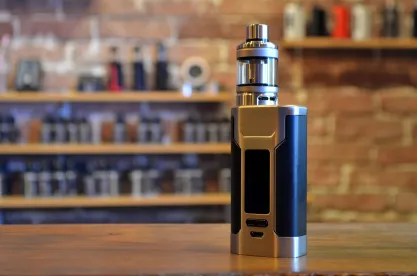Phillip Morris can’t seem to catch its breath. As discussed in a previous post, just a few weeks ago the Federal Circuit upheld the ITC’s ban on the importation and sale of Phillip Morris’s line of heated tobacco and electronic cigarette products offered under the brand IQOS. Phillip Morris now has to recharge its battery to fight against other allegations of infringement recently revived by the Federal Circuit. Indeed, a recent Federal Circuit decision provided Healthier Choices Management Corp. (HCMC) a second chance to fire up its patent infringement claims against Phillip Morris and its IQOS products.
In November 2020, HCMC filed suit against Philip Morris USA, Inc. and Philip Morris Products S.A. in the United States District Court for the Northern District of Georgia alleging patent infringement. More specifically, Phillip Morris’s IQOS products are purported to infringe claims related to a combustion electronic pipe in U.S. Patent No. 10,561,170. The asserted claims require a combustion reaction, e.g., claim 1 requires that the “heating element initiat[es] a combustion reaction in the combustible material reservoir” and method claim 5 requires a comparable initiating step. HCMC alleged in its original complaint that, notwithstanding Philip Morris’s claims that IQOS products are combustion-less because the tobacco is heated at a low enough temperature that the tobacco does not burn, the IQOS products do initiate a combustion reaction. In making this allegation, HCMC attached an exhibit that Philip Morris submitted to the FDA arguing the lack of combustion.
Phillip Morris moved to dismiss HCMC’s complaint and argued that the exhibit and portions cited by HCMC conclusively demonstrate that the IQOS products do not initiate a combustion reaction as required by the asserted claims of the ʼ170 patent. In addition, even though the amended complaint submitted with HCMC’s motion to amend removed reference to the exhibit, Phillip Morris argued that the exhibit was so essential to HCMC’s argument that the court should deny HCMC’s motion to amend. The district court ruled in Phillip Morris’s favor on all counts, denying HCMC’s motion to amend its complaint, dismissing HCMC’s original complaint, and awarding attorneys’ fees to Phillip Morris.
HCMC appealed. In addition to arguing that the district court erred in denying its motion to amend its case and dismissing the case, HCMC challenged the attorneys’ fees awarded to Phillip Morris and requested a different judge on remand. Phillip Morris countered that, because the court must accept as true all statements contained in an exhibit that was attached to and relied on by the complaint absent HCMC’s express disavowal of any such statements, and there was no such express disavowal, HCMC’s allegation that the IQOS products initiates combustion was implausible, and the lower court did not err in dismissing the complaint.
The appellate panel disagreed and explained that factual assertions made in an exhibit do not always control over contrary factual assertions on the same subject made in a complaint. The panel further expounded that “[w] here a . . . plaintiff attaches a . . . report to his complaint and alleges that it is false, . . . the contents of the report cannot be considered as true for purposes of ruling on a motion to dismiss.” And, while “a plaintiff seeking to disavow statements in an attachment to its complaint [is not required to] recite certain magic words to do so,” the infringement allegations here were “sufficient to disavow the contradictory statements . . . in which Philip Morris self-reported that its products do not combust”:
[O]n information and belief, while Defendants assert that the Accused Infringing Product does not cause combustion of the IQOS® Tobacco Sticks, Defendants’ own testing concludes that 97%, not 100%, of the harmful chemicals associated with combustion are eliminated by the Accused Infringing Product, and the presence of 3% of the two important combustion markers nitrogen oxides and carbon monoxide indicates that at least some combustion occurs when the Accused Infringing Product is operated as designed and intended by Defendants.
Ultimately, the panel concluded that HCMC’s original complaint plausibly alleged that combustion occurs and, thus, stated a valid claim for infringement.
With respect to the motion to amend and amended complaint, the appellate panel noted that HCMC’s amended complaint includes “allegations, more explicit than those in its original complaint, regarding how the IQOS system initiates combustion of at least a portion of the HeatStick.” The panel disagreed with the district court that the exhibit was so essential to HCMC’s allegations that the complaint could not be amended to remove the exhibit. The panel also explained that, even assuming the exhibit was so integral to HCMC’s allegations that it should be treated as attached to the amended complaint, HCMC expressly disavowed the exhibit’s statements regarding no combustion and raised a plausible allegation of patent infringement. Finally, the panel further noted that combustion testing by Phillip Morris cannot be the sole determinator of combustion at this stage (before claim construction) because Phillip Morris’s definition of combustion may be too narrow.
The attorneys’ fees award was vacated based on the reversal of the district court’s dismissal of the original complaint. A good win for HCMC, right? For the most part. But the Federal Circuit did not reassign the case on remand as requested by HCMC. While “the fact that the district judge ruled against [HCMC should be] of little impact,” it may nonetheless take some time for the court to thaw. Also, the Patent Trial and Appeal Board issued a Final Written Determination in December 2022 declaring all of the claims in the ʼ170 patent unpatentable. HCMC has filed a notice of appeal to challenge that determination, but the fate of the ʼ170 patent (and this suit) is unclear.




 />i
/>i

